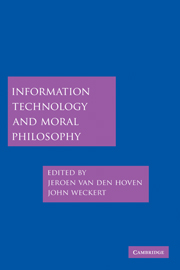Book contents
- Frontmatter
- Contents
- List of Contributors
- Introduction
- 1 Norbert Wiener and the Rise of Information Ethics
- 2 Why We Need Better Ethics for Emerging Technologies
- 3 Information Ethics: Its Nature and Scope
- 4 The Transformation of the Public Sphere: Political Authority, Communicative Freedom, and Internet Publics
- 5 Democracy and the Internet
- 6 The Social Epistemology of Blogging
- 7 Plural Selves and Relational Identity: Intimacy and Privacy Online
- 8 Identity and Information Technology
- 9 Trust, Reliance, and the Internet
- 10 Esteem, Identifiability, and the Internet
- 11 Culture and Global Networks: Hope for a Global Ethics?
- 12 Collective Responsibility and Information and Communication Technology
- 13 Computers as Surrogate Agents
- 14 Moral Philosophy, Information Technology, and Copyright: The Grokster Case
- 15 Information Technology, Privacy, and the Protection of Personal Data
- 16 Embodying Values in Technology: Theory and Practice
- 17 Information Technology Research Ethics
- 18 Distributive Justice and the Value of Information: A (Broadly) Rawlsian Approach
- Select Bibliography
- Index
- References
4 - The Transformation of the Public Sphere: Political Authority, Communicative Freedom, and Internet Publics
Published online by Cambridge University Press: 21 July 2009
- Frontmatter
- Contents
- List of Contributors
- Introduction
- 1 Norbert Wiener and the Rise of Information Ethics
- 2 Why We Need Better Ethics for Emerging Technologies
- 3 Information Ethics: Its Nature and Scope
- 4 The Transformation of the Public Sphere: Political Authority, Communicative Freedom, and Internet Publics
- 5 Democracy and the Internet
- 6 The Social Epistemology of Blogging
- 7 Plural Selves and Relational Identity: Intimacy and Privacy Online
- 8 Identity and Information Technology
- 9 Trust, Reliance, and the Internet
- 10 Esteem, Identifiability, and the Internet
- 11 Culture and Global Networks: Hope for a Global Ethics?
- 12 Collective Responsibility and Information and Communication Technology
- 13 Computers as Surrogate Agents
- 14 Moral Philosophy, Information Technology, and Copyright: The Grokster Case
- 15 Information Technology, Privacy, and the Protection of Personal Data
- 16 Embodying Values in Technology: Theory and Practice
- 17 Information Technology Research Ethics
- 18 Distributive Justice and the Value of Information: A (Broadly) Rawlsian Approach
- Select Bibliography
- Index
- References
Summary
Two relatively uncontroversial social conditions that have long been widely identified across many different modern theories of democracy: namely, the need for a rich associative life of civil society, and for the technological, institutional, and communicative infrastructure that permits the expression and diffusion of public opinion. Historically, the public sphere as a sphere of public opinion and communication has developed in interaction with a relatively unified structure of political authority: the state and its monopoly powers. Indeed, citizens of modern polities came to regard themselves as members or participants in various publics primarily through the attempts of states to censor and restrict public communication. Along with many other complex factors, the emergence of rights of communication and the democratization of state authority have emerged hand-in-hand. With the advent of new forms of political authority that directly impact the structure of communication across borders, new forms of publicity have also emerged and with them new public spheres.
If new forms of communication and structures of publicity do indeed exist across borders, this would give special salience to deliberation as an important basis for democratization, as well as for transnational institutional design. Given the differences between democratic arrangements that presuppose a singular demos and decentered ones that organize demoi, we should not expect that all democracies have exactly the same communicative infrastructure. This means that transnational civil society and public spheres face different difficulties with regard to independently constituted political authority from those faced by ‘strong,’ or state, public spheres.
- Type
- Chapter
- Information
- Information Technology and Moral Philosophy , pp. 66 - 92Publisher: Cambridge University PressPrint publication year: 2008
References
- 6
- Cited by

